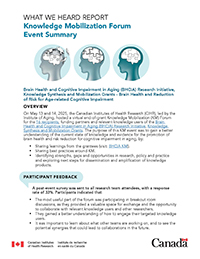What We Heard Report: End of Grant Knowledge Mobilization Forum Event Summary
Brain Health and Cognitive Impairment in Aging (BHCIA) Research Initiative, Knowledge Synthesis and Mobilization Grants - Brain Health and Reduction of Risk for Age-related Cognitive Impairment

What We Heard Report: End of Grant Knowledge Mobilization Forum Event Summary
Related
Overview
On May 13 and 14, 2025, the Canadian Institutes of Health Research (CIHR), led by the Institute of Aging, hosted a virtual end-of-grant Knowledge Mobilization (KM) Forum for the 16 recipients, funding partners and relevant knowledge users of the Brain Health and Cognitive Impairment in Aging (BHCIA) Research Initiative, Knowledge Synthesis and Mobilization Grants. The purpose of this KM event was to gain a better understanding of the current state of knowledge and evidence for the promotion of brain health and risk reduction for cognitive impairment in aging, by:
- Sharing learnings from the grantees (visit: BHCIA KM).
- Sharing best practices around KM.
- Identifying strengths, gaps and opportunities in research, policy and practice and exploring next steps for dissemination and amplification of knowledge products.
Participant Feedback
A post-event survey was sent to all research team attendees, with a response rate of 33%. Participants indicated that:
- The most useful part of the forum was participating in breakout room discussions, as they provided a valuable space for exchange and the opportunity to collaborate with relevant knowledge users and other researchers.
- They gained a better understanding of how to engage their targeted knowledge users.
- It was important to learn about what other teams are working on, and to see the potential synergies that could lead to collaborations in the future.
- Future BHCIA KM forums could be enhanced by holding in-person events to provide a better opportunity to network, collaborate and build relationships.
Event Description
Day 1
- Introduction to the BHCIA KM Hub: Brain Health Resources and Integrated Diversity (BRAID) Hub presentation.
- Quick Facts (part 1 of 2) presentations by the Knowledge Synthesis and Mobilization Grantees followed by a brief question period.
- Sharing best practices around KM panel:
- Neil Drimer, Director, Health Innovation Programs, Healthcare Excellence Canada.
- Shusmita Rashid, Director, Knowledge Mobilization and Strategic Relations, Centre for Aging + Brain Health Innovation (CABHI).
Day 2
- Quick Facts (part 2 of 2) presentations by the Knowledge Synthesis and Mobilization Grantees followed by a brief question period.
- Breakout Rooms: Identifying strengths, gaps and opportunities.
- Breakout groups report back.
Summary: Panelists - Sharing best practices around KM
The panelists discussed that knowledge mobilization must be audience-specific, inclusive, and action-oriented to achieve real-world impact - especially in dementia, aging and public health.
Effective KM includes:
- Co-creating with knowledge users early and throughout the research process.
- Simplifying evidence and making it relatable.
- Using multiple and accessible channels (not just academic journals).
- Prioritizing equity, cultural relevance, and lived experience.
Summary: Breakout Sessions - Strengths, gaps and opportunities
Participants were given a choice of four breakout rooms representing the following targeted knowledge user groups: Policy and decision makers, social and community care, healthcare providers and health system, and persons impacted by dementia, including persons living with dementia and caregivers. Key messages emerging from each group are captured below.
-
Policy/Decision Makers
- Building long-term, trust-based relationships - particularly with Indigenous and equity-seeking communities requires ongoing funding and respectful engagement.
- Knowledge uptake is more effective when aligned with policy mandates and presented with messages tailored for a targeted audience.
- Identifying the right policy levers, decision-makers, and maintaining engagement with policy makers is critical.
- Using stories, practical examples, and bringing people with lived experience to meetings grounds research in real-world impact.
-
Social and Community Care
- Relationship-building should be a core component of project planning and not an afterthought.
- Successful KM initiatives resonate when they:
- Reflect community needs.
- Leverage existing networks.
- Seek long-term engagement of people with lived experience beyond the grant cycle, for example, in advisory committees.
-
Healthcare Providers/Health System
- Find a political champion: Identify, for e.g. a Member of Parliament (MP), who is passionate or open to championing your cause.
- Example: One participant had a conversation with their MP and Deputy Prime Minister at their doorstep and secured a follow-up meeting to discuss national strategies.
- Be ready with an elevator pitch: If you meet a decision maker or policymaker unexpectedly, have a concise, impactful pitch prepared.
- To reach broader audiences, use innovative formats like podcasts, live streaming events, short videos and clinical/academic rounds.
- Partner or collaborate with national organizations or groups like Diabetes Action Canada, for example, that have networks of researchers, clinicians, and patient partners.
- Find a political champion: Identify, for e.g. a Member of Parliament (MP), who is passionate or open to championing your cause.
-
Persons Impacted by Dementia, including Persons Living with Dementia and Caregivers
- It is important to integrate and engage knowledge users, especially people with lived experience, from the beginning of the research process and not just at the end.
- There are strategic differences in how knowledge is transferred across provinces, in larger provinces with more complex systems. Community and advocacy groups can be more effective at driving knowledge forward than ministries (e.g., Health or Social Services).
- There is a need to adapt institutional and research practices to better accommodate the needs of people with dementia. Funders and academic institutions should recognize and support the additional effort required for authentic, inclusive engagement.
For more information
Thank you to all participants. Your insights will inform strategic directions for future brain health research and policy in Canada. For more information, please contact: BHCIA-SCTCV@cihr-irsc.gc.ca.
- Date modified: